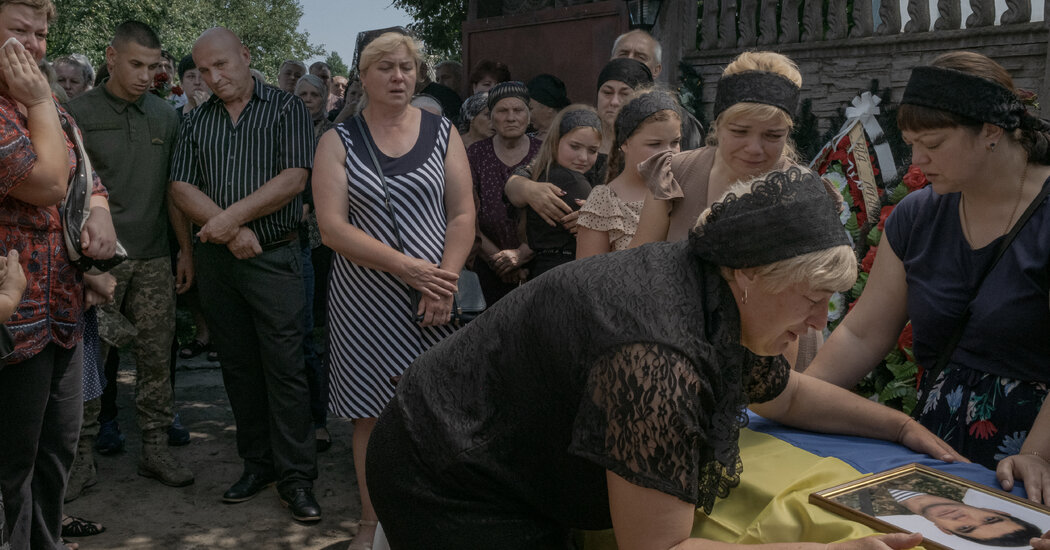
The United Nations is coordinating talks among Ukraine, Russia and Turkey in the hopes of hammering out security guarantees that would allow Ukraine to export its grain and help ease a global food crisis that is being exacerbated by the war.
But the Ukrainian government’s negotiator expressed skepticism in a recent interview with The New York Times that Russia would abide by any guarantee unless Kyiv had the military power to enforce it.
The Ukrainian negotiator, Rustem Umerov, told the Times that the country was preparing for talks in Istanbul to discuss a way to end Russia’s de facto blockade of the Black Sea port of Odesa to allow the shipment of the 20 million metric tons of grain Ukraine has in storage silos.
But he said that only the delivery of powerful naval weapons committed by Western allies would be an effective security guarantee, and he accused Russia of seeking to use the issue to shore up its own position in the Black Sea.
“If we will open up the ports, it means that the northwestern Black Sea will open up to them,” he said. No international backer, he added, “whoever guarantees us,” could be relied on to strike back if Russia then attacked Ukrainian shipping.
“And they understand it,” he said. “That’s why they are pressurizing the world to squeeze Ukraine to open up the ports.”
Before the war began, Ukraine exported about six million metric tons of grain a month, Kate Newton, an emergency coordinator for the U.N. World Food Program in Ukraine, said at a news conference in Kyiv on Thursday. Now, the country is only able to to export about one million metric tons per month, she said.
“We are doing everything we can,” she said, “exporting grain by truck, rail and river.” But, she said, without use of the Black Sea ports, it would not be possible to raise export levels much.
Russian forces have also bombed grain storage centers and fields across Ukraine. When Ukraine started shipping grain from a port on the Danube River, the Russians bombed the primary bridge trucks could use to get there.
In previous negotiations, Moscow has insisted on the right to “inspect” all vessels carrying Ukrainian grain — a condition that Kyiv would not accept.
Ukraine’s military on Thursday said it had driven Russian forces from Snake Island, a strategically important outcrop whose loss could undermine Moscow’s control over Black Sea shipping lanes. But Russia’s de facto blockade showed no sign of easing.
Mr. Umerov and Foreign Minister Dmytro Kuleba have accused Russia of sowing disinformation about who is to blame for the blockade. The grain issue, and even the prospect of famine, have become part an information war waged by Moscow, Mr. Umerov said.
“They are weaponizing the famine,” Mr. Umerov said. “They are addressing the African states, saying, ‘We are always ready to support you, it’s Ukrainians who are not opening the ports.’” African countries are heavily dependent on grain from Russia and Ukraine.
The Russian defense ministry cast its withdrawal from Snake Island as a humanitarian gesture and repeated that it was not to blame for the food crisis. But at a recent appearance, Margarita Simonyan, the editor in chief of the Kremlin mouthpiece RT, appeared to suggest that the crisis could be to Moscow’s political benefit.
“I’ve heard it several times in Moscow from many people: ‘All our hope is in the famine,’” she told the St. Petersburg Economic Forum on June 20, adding that those people’s expectation was that famine would drive countries to lift sanctions on Russia.
Kyiv has been working to counter that narrative. Last week, Mr. Kuleba spent an hour speaking to journalists from Africa, emphasizing Ukraine’s urgency to resume exporting.
“The only country that is not really under time pressure here is Russia,” he said in an interview. “Everyone else is running out of time, be it us as suppliers, African and Asian countries as recipients, or the United Nations, whose reputation is at stake.”



